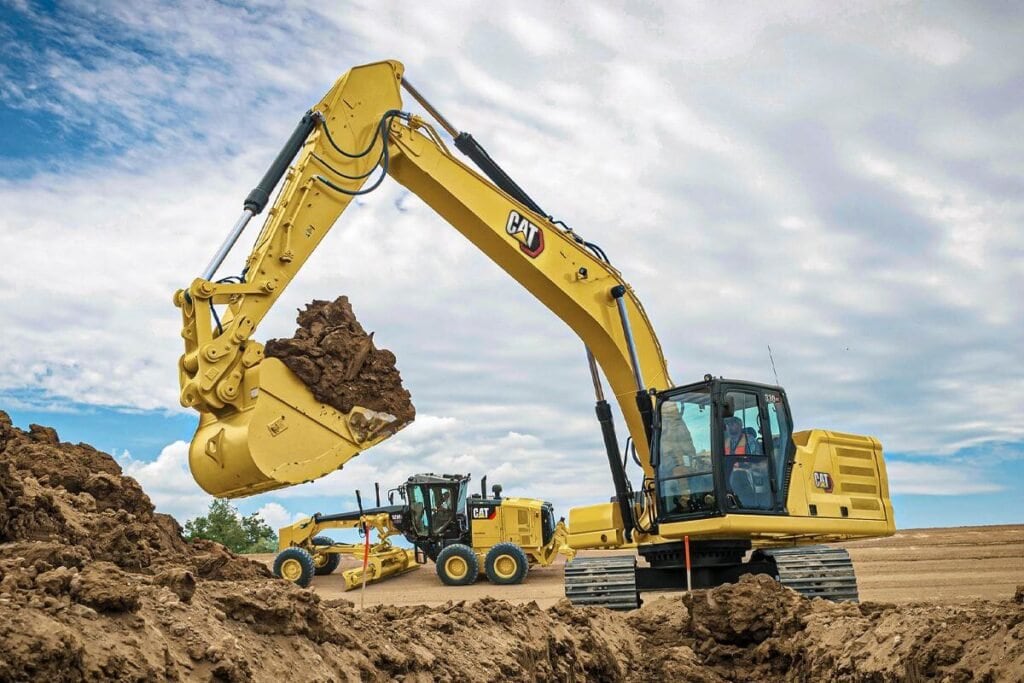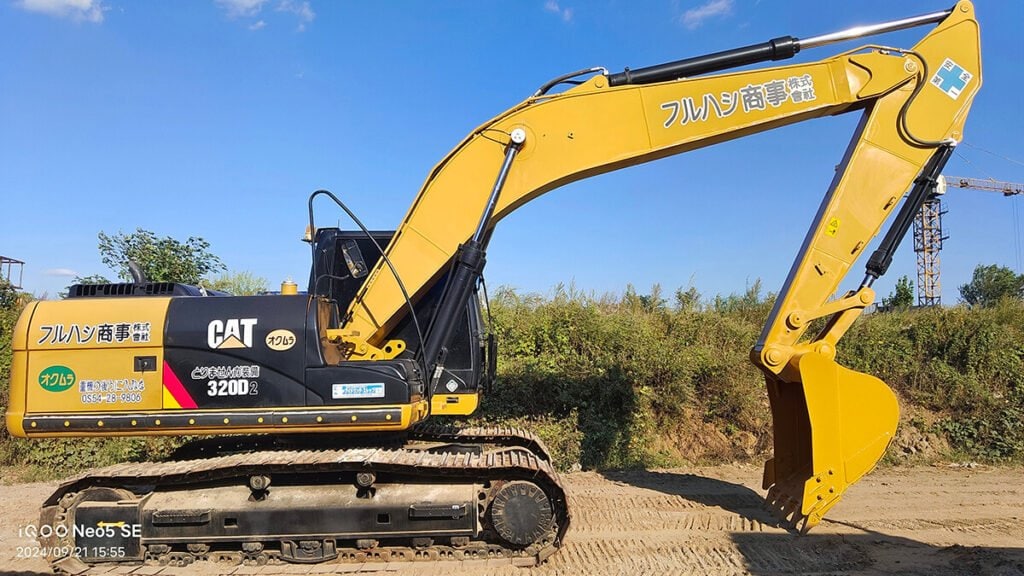Purchasing a used excavator is risky. A bad decision can cost you dearly and slow down your projects. However, savvy buyers follow the given tips for buying an excavator to eliminate problems.
The best excavador tips include checking machine condition, following an excavator maintenance checklist, verifying certifications, evaluating suppliers, and comparing brands. These steps help avoid costly mistakes and guarantee safer, more profitable purchases.
Now, let’s go through each step in detail to help you buy smarter.

Why Are Excavator Tips Important When Buying Used Equipment?
When you buy a used excavator in a hurry, without checking everything you should, you risk hidden defects, dodgy shipping, and financial pain. Get to know and adhere to these used excavator tips to safeguard your money.
Excavator tips are important. They protect you against scams. These excavator tips help you get a better resale value. Also, these tips help you feel more secure about buying an expensive machine like a CAT excavator.
In markets like Peru or Africa, you could be dealing with dodgy suppliers. These tips will help you know if you’re getting a good machine or a bad one. When it comes to a Cat 320 or a Komatsu excavator, everybody wants one, but if it hasn’t been maintained and you can’t prove that, it’ll kill you every time.
Buyers who are interested in renting an excavator also need to understand the types. You have the big-boy, the large hydraulic excavator or the dragline excavator, and then you have the little mini-excavator. People are always interested in what the miniexcavator rental cost is, but guys like me are usually looking to buy Gato 313 or Cat 315 for sale because they last forever.
Everyone says to learn the proper placement of the excavator controls or all the cool tricks you can do with an excavator. I say get the technical knowledge to use the equipment that you’re buying, even if you don’t plan to use it, you can negotiate better.
By knowing just a few simple excavator maintenance tips and the correct things to look for, you’re able to protect yourself, make more money, and make your equipment last.

What Should I Check During A Used Excavator Inspection?
An inspection tells the story of a machine. If you skip the checks, you’re rolling the dice with your money.
During an inspection, pay attention to the engine, hydraulics, undercarriage, and structure. Walk through an excavator maintenance checklist to know what to look for and avoid getting stuck with a machine that has unseen damage.
Engines will make or break you. If the cylinders in the engine are shot, you’re looking at thousands of dollars in repairs that you’ll have to make immediately. Listen to the engine. Check the fluids. Look at the hours and compare them to the wear.
Hydraulics are next. If the lines are weak or the cylinders are slow, they’ve neglected the maintenance on that Volvo excavator or Sany excavator. Look at the tracks on the excavator and the teeth on the bucket. That’ll tell you how much use this machine has seen.
For smaller equipment, see if you can grade with the mini excavator blade or test out the mini excavator trenching technique. Those practical mini excavator tips and tricks will show you if the controls are smooth.
Always ask for the maintenance manual. If they don’t have it, they may be hiding something. This will allow you to compare models like the Cat 308d for sale, Cat 330 excavator for sale, or the Kubota mini excavator so that you can learn to spot the differences in conditions.

How Can I Ensure The Supplier Is Trustworthy?
The best excavator in the world won’t do you any good if the person you’re getting it from can’t get it to you safely and on time. It all comes back to trust.
Check their licenses, reviews, and export history. Save time dealing with people who have inspection reports from reputable companies and can handle the logistics. Clear communication and trust are critical when buying a used excavator.
If you’re on Alibaba or Made-in-China, they’ll have little icons that show you if they’re a verified supplier. These companies will also show their certifications. Always pick the companies that have experience exporting cat excavator sale or komatsu excavator models to whatever country you are in.
How long have they been in business? If they’ve been around 15+ years, they know how to take care of customs and all the paperwork to get a Cat 323f price or a Cat 390 long reach machine to your facility the most efficient way possible.
Communication is critical. Many buyers complain about slow responses or no response at all. Once a buyer asks for more information or makes an inquiry, respond instantly with videos of the machine, the results of the inspection, videos of the undercarriage, and an explanation of payment options.
Good sellers will give you tips on how to maintain your excavator, share technical knowledge with you, and advise you on how to run your excavator. You don’t want to deal with someone who won’t let you do a third-party inspection on a machine or who takes forever to let you know when something has shipped.

Which Brands Offer The Best Value In Used Excavators?
Choosing the right brand means balancing cost, performance, and resale. The most common brands lead the excavator for sale market worldwide. CAT emphasizes durability, Komatsu is all about efficiency, and Sany focuses on affordability. Choose to cater to your project and what’s in demand locally.
The most popular is the 320, especially among distributors. The 320 has a higher degree of acceptance because of its size, strength, and resale value. For a mid-size contractor, the 313 or 315 are usually stronger than they need.
A lot of people who buy Komatsu excavators are interested in the fact that they get better fuel consumption. On the other hand, people are looking for something less expensive might look at the Sany. With Volvo excavators and Liebherr excavators, you have a machine that is going to be reliable. Especially with the Liebherr, you have a machine that is going to have the most advanced technology.
For the little jobs, many people are using a Hitachi mini excavator or a Kubota mini excavator, or they just rent one because of the mini excavator rental cost benefits. When you’re doing a big project, you need a big tool. You’re probably going to get a Cat 330 for sale or maybe even a Cat 390f specs. Knowing the size of your project will protect you from over-buying.

What Are The Most Common Mistakes When Buying Used Excavators?
Mistakes during an excavator purchase can kill your profits. Most mistakes are avoidable. Here’s what to look out for: Skipping inspections. Ignoring certifications. Miscalculating shipping. You need to learn the structured tips and techniques that we teach our students to keep from getting smacked around.
Another mistake is rushing during peak season. People buy a Cat 308 excavator on auction without a full inspection and end up needing parts and downtime on their jobs. People sometimes underestimate the logistics and regulations to move a 13-ton excavator when they have to get permits and pay the high cost for hauling that kind of weight.
Some people also buy off only pictures. Someone could have taken that Chinese 220, repainted it, and it looks pretty, but it’s got bad injectors. The only way you are going to know is to compare to what you know from the maintenance manual and see their service history.
Neglecting to follow safety tips is a mistake. A machine that arrives uninspected can lead to an expensive mistake like an excavator tipping over because you don’t know what you are doing. By avoiding these mistakes, you will save money, time, and improve the results of your excavator buying efforts.

How Do Payment And Logistics Affect Used Excavator Purchases?
Safe payment and secure shipping guard both of you from fraud and hassle. This is as important as inspection.
Use LC or TT with trusted banks. Partner with exporters experienced in freight forwarding to South America or Africa.
For big machinery purchases like a Cat 323f price machine or Cat 320f price machine, you need a secure way to pay. A Letter of Credit (LC) protects you. A Telegraphic Transfer (TT) is faster. It depends on how much you trust the supplier.
Then there’s the issue of shipping. With dependable exporters, they’re going to do all the prep on the machine. They’ll secure the track, attach the bucket tips, and document everything on the container.
Delays cost you money, especially if you’re anticipating peak-season profits. Most experienced exporters handle all customs, clearances, and delivery schedules. Endeavour caters more to moving heavy units like a Gato 330 excavador for sale than small ones like a micro excavator. Get good logistics people on your side to prevent expensive issues. Make sure your machine arrives ready to fire up.

What Not To Do When Operating An Excavator?
Even if you have a good machine, it’s still important to use safe working procedures. If you do something wrong, you cause damage or get hurt.
Overloading, running on unsafe ground, skipping safety checks; this is how you skip the tips so you don’t have the tips over.
Operators should learn to operate an excavator safely. Reading the excavator maintenance manual and applying mini excavator safety practices prevents accidents.
Overloading the machine, like the Cat 320, that’s what weakens the structure. Ignoring the tips we’ve covered or using lousy techniques for digging are how you bankrupt a machine.
On a small job, use your mini-excavator operating tips and tricks to avoid getting hurt. They save the life of the machine. Use backhoe operating tips and backhoe excavation techniques that help a machine save money.

What Happens If You Don’t Grease An Excavator?
Greasing is simple but critical. Neglecting it leads to quick wear and expensive failures. Without regular greasing, excavator pins, joints will fail. A regularly maintained excavator will last a long time and perform better.
By failing to grease your machine, you create metal-on-metal friction. Even a sturdy piece of equipment like the Cat 390 long reach or the Cat 308 excavator can go down prematurely because you’re not greasing it. Each manufacturer also specifies how often each machine should be greased. Therefore, if you’re looking at a used machine and there are no records of how often it was greased, whether it is a Kubota mini excavator, a Temu excavator, a Sany excavator, or any other brand, that’s a red flag.
Keeping a regular greasing schedule also increases the resale value of your equipment. It’s easier to sell your machine if you have taken care of it, whether it’s a Cat 323F or a Case Excavator-sized model. By following these simple maintenance tips, you will extend the life of your equipment, reduce downtime, and ensure your machine is there for you when you need it.
Summary
Follow these excavator tips on inspections, brands, suppliers, and maintenance. Whether it’s a used Caterpillar excavator, a Komatsu excavator, a John Deere excavator, or a Hitachi excavator, taking the extra time to perform smart due diligence will make sure that every used excavator you purchase will be safe, reliable, and profitable.